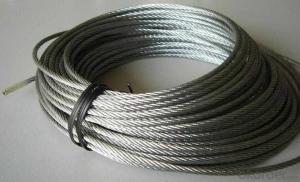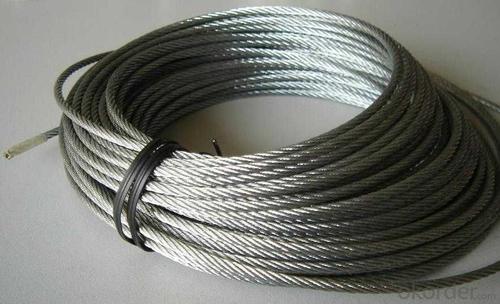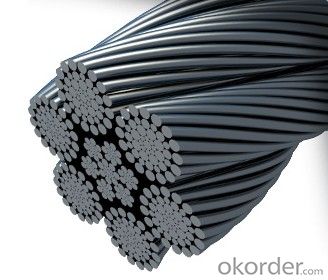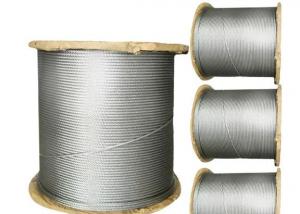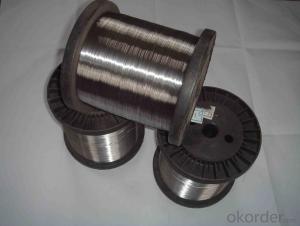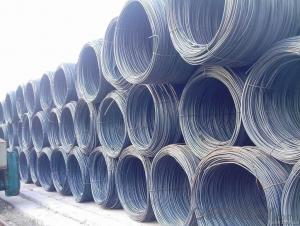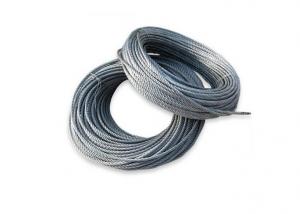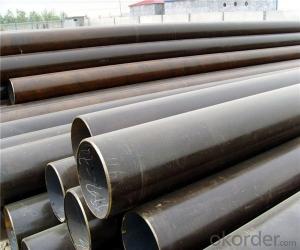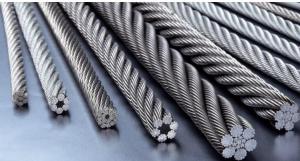Stainless Steel Wire Rope Hot Sale and High Quality
- Loading Port:
- Shanghai
- Payment Terms:
- TT OR LC
- Min Order Qty:
- 20 m.t.
- Supply Capability:
- 300 m.t./month
OKorder Service Pledge
OKorder Financial Service
You Might Also Like
Specifications
304 stainless steel wire rope
- Grade: 300s,400s,200s.
- Main advantage grade: 304,304L,316,316L etc.
- Standard:AISI,ASTM,DIN,GB,JIS,CSA,AS,API,BS,IEC,CSA..
- Certification: ISO9001
- Dimeter: 0.15mm-60mm.
- Length: 200m/reel,305m/reel,500m/reel,1000m/reel,1525m/reel etc.
- Construction:1X7,1X19,6x7,7X7,6x19,7X19,6X37,7X37,8x19,19X7 etc. Many constructions to meet your requirements.
- Surface: galvanized (Electro & hot-dip)/ungalvanized , CoatedPVC/PE/NYLON steel wire rope etc.
- Technique: Hot/Cold Rolled.
- Twist Direction: RHRL,RHLL,LHRL,LHLL.
- Nominal Tensile Strength:1,570Mpa;1,670Mpa;1,770Mpa;1,870Mpa etc.
- Application:Crane cable,Trucker cable,Ship cable,Aircraft cable,Automobile clutch cable,Control cable,Telecommunication.Elevators,woven wire sieve,handcraft,Wire drawing office equipment,Electrical home appliances and raw material,Clocks and watches,Mechanical equipment,Hardware components,etc.
- Packing:Safety export wooden/plastic reel/as the requirement of customer.
- Q: Can steel pipes be used for underground culverts?
- Indeed, underground culverts can utilize steel pipes. Renowned for their robustness, longevity, and ability to withstand diverse environmental influences, steel pipes are ideal for subterranean applications. They exhibit exceptional resilience to substantial burdens, intense hydrostatic pressure, and the erosive impact of soil and water. Moreover, steel pipes offer a range of dimensions and thicknesses, enabling customization to meet precise project prerequisites. Nevertheless, prudent consideration must be given to variables such as soil attributes, water table elevations, and the likelihood of corrosion during the selection of the most fitting steel variant and protective coatings for the pipes.
- Q: Are steel pipes resistant to vibration?
- Yes, steel pipes are generally resistant to vibration due to their high strength and rigidity.
- Q: What are the different types of pipe connections used with steel pipes?
- There are several types of pipe connections used with steel pipes, including threaded connections, welded connections, flanged connections, and grooved connections.
- Q: How are steel pipes connected or joined together?
- Steel pipes are typically connected or joined together using various methods such as welding, threading, flanges, or couplings.
- Q: Can steel pipes be used for sewage and wastewater systems?
- Yes, steel pipes can be used for sewage and wastewater systems. Steel pipes are highly durable, resistant to corrosion, and can withstand high pressure and temperature conditions, making them suitable for transporting sewage and wastewater efficiently and securely. Additionally, steel pipes have a long lifespan and can handle the abrasive nature of sewage and wastewater, making them a reliable choice for such systems.
- Q: How do steel pipes differ from other types of pipes?
- Steel pipes differ from other types of pipes in several ways. Firstly, steel pipes are incredibly durable and strong, making them suitable for carrying high-pressure fluids and gases. They have a high resistance to corrosion and can withstand extreme temperatures, making them ideal for various industrial applications. Additionally, steel pipes have a smooth interior surface, which reduces friction and allows for efficient flow of liquids or gases. They are also highly versatile, as they can be easily welded, threaded, or bent to fit specific project requirements. Overall, steel pipes are known for their strength, durability, and versatility, making them a preferred choice in many industries.
- Q: How are steel pipes used in the shipbuilding industry?
- Steel pipes are commonly used in the shipbuilding industry for various applications such as the construction of the ship's hull, piping systems for fuel, water, and other fluids, as well as for the ventilation and drainage systems on board. These pipes provide strength, durability, and corrosion resistance, making them ideal for withstanding the harsh marine environment.
- Q: Is there any difference between HFW steel pipe and ERW steel pipe?
- ERW steel is high frequency ERW pipe, English Electric Resistance Welding, referred to as the abbreviation of machined steel in diameter and wall thickness of the pipe size range, with greater flexibility, especially in production
- Q: How do steel pipes handle chemical substances?
- Steel pipes are highly resistant to chemical substances due to their high strength and corrosion-resistant properties. They can safely handle a wide range of chemical substances without undergoing any significant degradation or damage.
- Q: 45 and 316 which steel tubes are of high hardness?
- No. 45 steel for high-quality carbon structural steel, the hardness is not high machining, used to make the template, mould studs, guide column, subject to heat treatment. 45 steel quenched and tempered hardness between HRC20~HRC30; 45 steel quenching hardness between HRC55~58, the limit value of up to HRC62.
Send your message to us
Stainless Steel Wire Rope Hot Sale and High Quality
- Loading Port:
- Shanghai
- Payment Terms:
- TT OR LC
- Min Order Qty:
- 20 m.t.
- Supply Capability:
- 300 m.t./month
OKorder Service Pledge
OKorder Financial Service
Similar products
Hot products
Hot Searches
Related keywords
